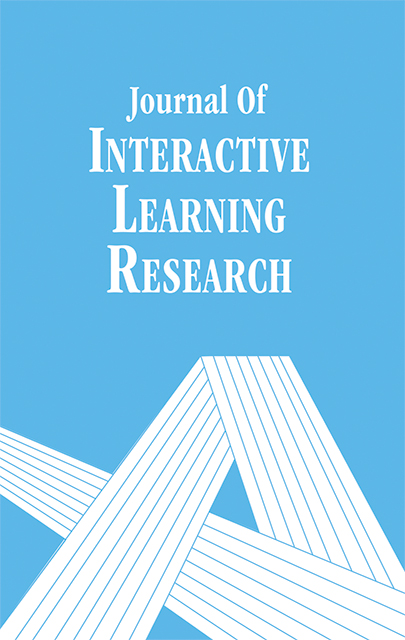
From Traditional to Constructivist Epistemologies: A Proposed Theoretical Framework Based on Activity Theory for Learning Communities
Article
David Hung, Seng Chee Tan, Thiam Seng Koh, Nanyang Technological University, Singapore
Journal of Interactive Learning Research Volume 17, Number 1, ISSN 1093-023X Publisher: Association for the Advancement of Computing in Education (AACE), Waynesville, NC
Abstract
This article is concerned with how learning communities are transformed as they evolve from traditional learning epistemologies towards constructivist orientations and pedagogies. Adopting activity theory as a framework, the article discusses how transformations take place through a two-way process of appropriation (learning from one another as a two-way interaction process) at both the social-collective and individual-learner levels of interaction and cognition. We distinguish transformations at two levels: context and process, acknowledging overlaps between the two. Context transformations involve the macro-level activity system, whereas process transformations are concerned with in-situ micro-level changes. Through the concept of activity systems, we hope to illustrate how evolving transformations are captured from a historical frame of reference. The article also discusses technologies as enablers within a proposed framework in support of such epistemological transformations.
Citation
Hung, D., Tan, S.C. & Koh, T.S. (2006). From Traditional to Constructivist Epistemologies: A Proposed Theoretical Framework Based on Activity Theory for Learning Communities. Journal of Interactive Learning Research, 17(1), 37-55. Chesapeake, VA: Association for the Advancement of Computing in Education (AACE). Retrieved August 7, 2024 from https://www.learntechlib.org/primary/p/6020/.
© 2006 Association for the Advancement of Computing in Education (AACE)
Keywords
References
View References & Citations Map- Clancey, W. (1997). Situated cognition: On human knowledge and computer representations. Cambridge, UK: Cambridge University Press.
- Engestrom, Y. (1999). Activity theory and individual and social transformation In Y. Engestrom, R. Miettinin, & R Punamaki (Eds), Perspectives on activity theory (pp. 19-38). New York: Cambridge University Press.
- Hung, D. (2003). Supporting current pedagogical approaches with neuroscience research. Journal of Interactive Learning Research. 14(2), 129-155.
- Jonassen, D. (1999). Designing constructivist learning environments. In C. M. Reigeluth (Ed), Instructional-design theories and models: A new paradigm of instructional theory (Vol II, pp. 215-239). Mahwah, NJ: Lawrence Erlbaum.
- Jonassen, D. (2000). Revisiting activity theory as a framework for designing student-centered learning environments. In D. Jonassen & S. Land (Eds), Theoretical foundations of learning environments (pp. 89-121). Mahwah, NJ: Lawrence Erlbaum.
- Kim, A. J. (2000). Community building on the web: Secret strategies for successful online communities. Berkeley, CA: Peachpit Press.
- Kuutti, K. (1996). Activity theory as a potential framework for human-computer interaction research. In B. A., Nardi (Ed), Context and consciousness: Activity theory and human-computer interaction (pp. 17-44). Cambridge, MA: MIT Press.
- Lave, J., & Wenger, E. (1991). Situated learning: Legitimate peripheral participation. Cambridge, UK: Cambridge University Press.
- Leont’ev, A. N. (1978). Activity, consciousness, and personality. Upper Saddle River, NJ: Prentice-Hall. Nardi, B. (Ed).
- Preece, J. (2000). Online communities: Designing usability, supporting sociability. New York: John Wiley & Sons.
- Rheingold, H. (1994). The virtual community: Homesteading on the electronic frontier. New York: Haper Perennial.
- Ricoeur, P. (1997). From text to action: Essays in hermeneutics. Evanston, IL: Northwestern University Press. (Original work published 1991)
- Ricoeur, P. (1998). Hermeneutics and the human sciences. Cambridge, UK: Cambridge University Press. (Original work published 1981).
- Roth, W. M. (2002). Designing learning communities. Retrieved September 11, 2005, from http://www.educ.uvic.ca/faculty/mroth/PREPRINTS/Design103.pdf
- Salmon, G. (2000). E-moderating: The key to teaching and learning online. London: Kogan. Scardamalia, M. (2002). Collective cognitive responsibility for the advancement of knowledge. In B. Smith (Ed.). Liberal education in the knowledge society (pp. 67-98). Chicago: Open Court. Scardamalia, M., & Bereiter, C. (1991). Higher levels of agency for children in knowledge building: A challenge for the design of new knowledge media. The Journal of the Learning Sciences, 1(1), 37-68.
- Schwab, J. (1962). The teaching of science as enquiry. Cambridge, MA: Harvard University Press. Smith, C., Maclin, D., Houghton, C., & Hennessey, M. G. (2000). Sixth-grade students’
- Vygotsky, L. S. (1978). Mind in society: The development of higher psychological processes Cambridge, MA: Harvard University Press.
- Vygotsky, L. S. (1981). The genesis of higher mental functions. In J.V. Wertsch (Ed.), The concept of activity in Soviet psychology (pp. 144-188). White Plains, NY: M. Sharpe.
- Wenger, E. (1998). Communities of practice: Learning, meaning, and identity. Cambridge, UK: Cambridge University Press.
- Wertsch, J. V. (1995). The need for action in sociocultural research. In J.V. Wertsch, P. Del Rio, & A. Alvarez. (Eds.), Sociocultural studies of mind. Cambridge, MA: Cambridge University Press.
These references have been extracted automatically and may have some errors. Signed in users can suggest corrections to these mistakes.
Suggest Corrections to ReferencesCited By
View References & Citations Map-
Adoption of blogging by a Chinese language composition class in a vocational high school in Taiwan
Shi-Jer Lou, Shi-Chiao Wu, Ru-Chu Shih, Kuo-Hung Tseng & Kuo-Hung Tseng
Australasian Journal of Educational Technology Vol. 26, No. 6 (Jan 01, 2010)
These links are based on references which have been extracted automatically and may have some errors. If you see a mistake, please contact info@learntechlib.org.
